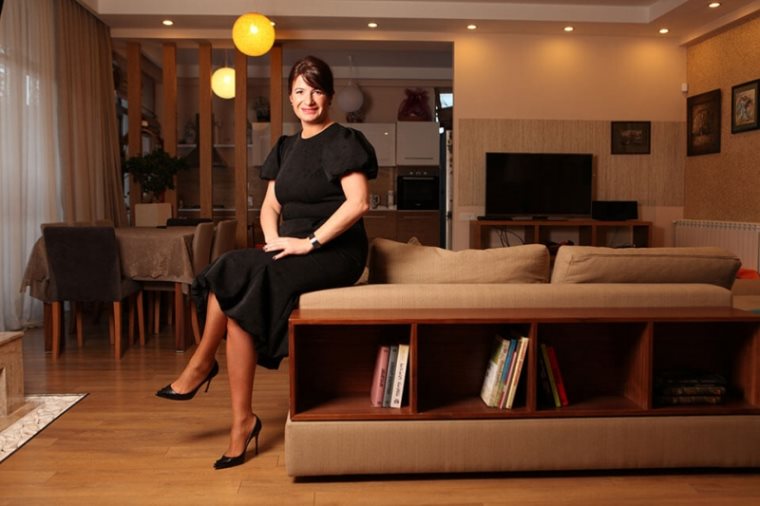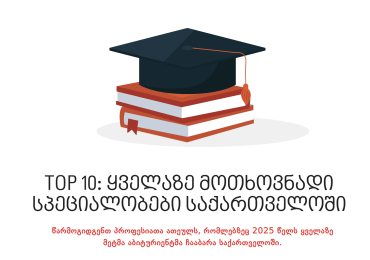Nina Kobakhidze left her job in public service and returned to the insurance industry. In doing so, she re-entered a market that has very few major players, and where the largest share of gross sales (79%)is distributed among three types of insurance products. The new insurance company is backed by major US and Georgian partners.
Nina Kobakhidze, the founder and director-general of Global Benefits Georgia, is convinced that she is contributing to the economic and general security of her country. Kobakhidze’s philosophy is simple: when many major, internationally-recognized market players set up shop in your country, both friend and foe will think twice before causing a confrontation, because they won’t just be confronting that country, they will be confronting all whose interests intersect with it.
This theory of intersecting interests seems to have some merit, and is supported by a 2015 statistical report published by the State Insurance Supervision Service of Georgia. In the report, the data indicates that the total amount paid in insurance premiums in Georgia came to a360 million in 2015, comprising only 1.1% of the country’s total GDP. This figure is considerably lower than it is in developed countries where insurance premiums make up 8.7% of total GDP. Even in developing countries like Georgia, insurance premiums comprise 2.8% of GDP.
“On the one hand, this figure illustrates the low level of development on the Georgian market, and at the same time it shows enormous untapped potential,” says Kobakhidze.
Indeed, if we look at the 2015 figures again, we see that the largest share of total premiums sold (79%) accounts for only three types of insurance products –medical, property and land transport insurance. The share of other kinds of insurance products is minimal. However, over the past few years, gross premiums within the insurance industry have amounted to several hundred million lari, and this trend continues to grow.
Kobakhidze’s return to the world of business with Global Benefits Georgia means returning to a market where among the 14 companies operating on the market, there are only three obvious leaders, and their total share of the market amounts to 58%.
A special marketing survey was conducted in order for the company to determine its priorities in the insurance sector, and to provide insight in the development of the insurance sphere. The survey shows that Global Benefits Georgia will need to focus on high-quality consumer service and the development of a simple, fair and effective reimbursement system. The company plans to use all available channels in the sale of its products – direct, retail, electronic and intermediary/brokerage.
In a nutshell, Kobakhidze’s company, together with its local and international partners, plan to introduce a new signature to the Georgian insurance market – innovative products and a flexible, personalized approach to their partners.
Kobakhidze did not think for very long when the opportunity to return to the private sector presented itself. That’s not because she was surfeited with public service or felt she had used up her capabilities. On the contrary, by her own account, she made the decision because it was an opportunity to fulfill her dreams.
“Just imagine, everything I ever wanted to do in my life, the plans that I had, the right way of development. Everything that I tried to convince others of… All of a sudden I get an opportunity to accomplish all of it,” Kobakhidze says emphatically.
I can tell that she is trying her best to get across the emotions she is experiencing. They’re are the kinds of emotions that accompany sudden, but well thought-out decisions, instances of worrying and anxiety infused with persuasive arguments, which often force us to take risks in order to challenge our abilities and turn our accumulated ideas into a tangible product.
Risk management is Kobakhidze’s calling. She was 22 years-old when she first came into contact with the insurance business. By that time she had already graduated from the faculty of law at Tbilisi State University, and had even studied at Sorbonne University. In 2003, she went for an interview at a company that she thought was producing gasoline.
“It turned out to be an insurance company,” she recalled, as a broad smile spread across her face. She continued to tell me how she gave up studying at Sorbonne University for a ridiculous salary at the insurance company. Her first job and first contact with the insurance business started with her role as a sales manager. After eight years at the company, she climbed the career ladder as the company expanded –going from 20 employees to 1,000 employees. Eventually, she left her position as Head of the Sales Department where she was in charge of the regional network.
Kobakhidze’s decision to change jobs was again prompted by a new opportunity.
In 2011, the leading insurance broker Gras Savoye became interested in the Georgian market. Kobakhidzeexplained to me that there were two major players on the market at the time, and both were in desperate need of an experienced international partner to strengthen their position. Gras Savoye had to decide which of these two groups it wanted to partner with.
Both companies received the same answer. The official letter stated that Kobakhidze was vested with the authority to choose the partner for Gras Savoy. An opportunity to work with Kobakhidze was all that mattered for one of the major international insurance brokers. “It was something to be very proud of,” Kobakhidze told me.
That’s when she first realized that she had become an official partner of a leading French company – she was the founder and director of the Georgian branch of the world’s leading insurance broker.
“I was going into the kind of business that was so close to me – insurance and insurance consulting,” she said. That’s how Kobakhidze left her first job and took a new challenge as the founder of her own company.
Some of Kobakhidze’s colleagues and employees from her old job followed her to the new company. It was a wise move, as they now work for an even stronger company. This is because Gras Savoy Georgia was recently taken over by Willis Towers Watson – a leading global advisory, broking and solutions company with over 39,000 clients spanning 120 countries. Essentially it was Kobakhidze who ushered-in this company to Georgia, and while she remained the founder of the company, she withdrew from active management in order to try her luck in public service.
As it turned out, it was only temporary. Since 2012, Kobakhidze’s resume is material proof that since the time she took interest in the insurance industry, there hasn’t been a moment that she stopped identifying herself as a business woman. Moreover, everything she did in the sphere of public service, Kobakhidzeadjusted it according to business principles.
After she accepted the offer from then Minister of Interior Irakli Gharibashvili to test her abilities in public service, she embarked on a mission to develop the Service Agency of the Ministry of Internal Affairs.
“In its essence, the Service Agency is a business structure that should be able to provide certain services,” Kobakhidze noted. “It took us exactly three months to accomplish a five-year program,” she added.
Kobakhidze believes that their main achievements were the introduction of a simplified electronic system for issuing certificates, new car registration plates, and new driving tests.
“We practically laid the groundwork for on-street driving tests,” she noted.
Later, when Gharibashvili became Georgia’s new prime minister he took Kobakhidze along with him, and she found herself working at the State Chancellery.
“I was entrusted with developing a European model for policy planning and coordination, along with managing the prime minister’s visits, coordinating his protocol activities, official meetings, and his coordination with donors.Before long, I was also in charge of the prime minister’s PR image. However, it was impossible to perform so many functions and tasks all at once,” recalled Kobakhidze, who had already officially transferred to the business sector by the time the February edition of ForbesGeorgia was published.
Her first major impression came after her visit to the United States. She still remembers the details of her meeting with President Barack Obama. During the interview, her voice changes here and there as she recalls the emotions she felt at the time.
“Of course it was a stroke of luck. It was my first time at the chancellery, and I was told that my first official visit would be a meeting with the US President.”
Altogether, Kobakhidze worked with two prime ministers. During this time, she says she gained a lot of experience and carried out her duties successfully. “In precisely one year, we achieved such good results that I recall receiving a letter of gratitude from the EU Ambassador.” Her only regret is that she did not stay long enough to follow through with the e-governance reform.
“I hope that this reform is completed. It will require more coordination and less bureaucracy when the exchange of documents occurs,”she says.
However, when Kobakhidze recalls her last conversation with Prime Minister Kvirikashvili, there is one phrase – “Your drive will be very useful in this sector” – it gives her additional motivation to return to the insurance market as a business partner and a guardian of success.
She summarizes her time working in public service as an opportunity to do things that will undoubtedly be beneficial for the country well into the future. Among these projects she worked, two stand out for Kobakhidze – the Solidarity Fund and the Center for International Education (CIE). She approached the development of both structures with her usual business savvy, and thus far, the results of her efforts have borne quite a bit of fruit.
The Solidarity Fund has mobilized a9 million, engaged 40 companies, 60,000 public servants, and has financed 356 children.
“You know, when you are going through difficult times and there is no other way out, the state is there to support you.”Kobakhidze’s explains, highlighting the main philosophy behind the project.
As far as the Center for International Education (CIE), 300 students have received funding so far.
“Sometimes I say jokingly that I renewed this center for myself. Because now that I will require new staff for by business, I will most definitely take advantage of this resource,” Kobakhidze remarks playfully.
Returning to the business sector will represent a new challenge for her. In her interview with Forbes Georgia, Kobakhidze admits that the first signal that prompted her to return to her original love was when Willis Towers Watson took over Gras Savoy. Her decision to return to the business sector was finally cemented by the successful outcome of negotiations that took place with the US Global Benefit Group. Moreover, the Georgian Industrial Group (GIG) also took interest in the potential of a new market player.
The American company GBGI, is an independent international insurance company with 36 years of experience in the field. Its main activities include the development of health, life, travel and other special risk insurance products, and the reinsurance for both individual and corporate clients. The company’s head office is located in the US state of California, and its regional offices operate in 11 locations on three different continents – North America, Europe and Asia.
“When you speak to the United States, you’ve got to have a major Georgian partner to back you,” says Kobakhidze, who attempted to explain to me the logic behind major business transactions in a simple and concise manner. She does not have a weak point – even here. The Georgian Industrial Group (GIG), a major financial group run by Dato Bezhuashvili is her Georgian partner for her new venture.
“GIG, with more than 3,000 employed staff and combined annual sales revenue of over half a billion lari, is one of the major industrial groups in Georgia,” she says. Kobakhidze’s venture immediately meshed with the long-term strategy of the company, which has 20 years of history. Not to mention, GIG constantly strives to invest countrywide in major, economically justified projects in an effort to achieve growth, and high efficiency.
“I primarily view strong local players and particularly major international companies as investment coordinators and conduits, and not just as entities that bring in investment. In other words, we can use such companies to facilitate new contacts and attract new investors,” says Kobakhidze, who herself has an extensive and successful track record of using her business contacts.
Once again Kobakhidze managed to assemble an unbeatable trifecta: a company with extensive experience on the Georgian market that was taken over by an international brokerage company, an American partner that plans to launch an IPO in the near future, and a Georgian group that is currently a leader in the field of risk reinsurance.
Kobakhidze may be a new market player, but she has incredibly ambitious goals. The corporate segment will receive insurance services from Kobakhidze’s Global Benefits Group (the parent company) that are on a par with the international products and services developed by this group. Global Benefits Georgia will provide health and life insurance services. The Georgian market will then have access to all international medical services offered by the Global Benefits Group, which in a nutshell, can be described as global support – universal health insurance.
At the same time, based on the individual needs of various businesses, Global Benefits Georgia will carry out risk management and insurance operations. However, life insurance will not be included.
“Initially, we anticipate that it will be a bit difficult at first. However I want to use Willis Towers Watson and the GBG network in the gradual introduction of new products and a new approach. While today only insurance companies exist on the Georgian market, ours will be a risk management, insurance and reinsurance group offering the market not only its own products, but also the products of other insurance companies that we plan to establish relationships with, offering our partner businesses based on specific products,” Kobakhidze explains. She says that the development of the insurance sector is of crucial importance for the private sector.
“When business risk is not insured, its development is hindered, and without the development of the private sector, rapid economic growth can’t occur. This is a cycle – a chain reaction: secured business and successful business partners operating on the market: All of these combined creates wealth for the country,” she says.
Many things have changed since the 22 year-old Kobakhidzefirst entered the insurance market. In the old days, people did not really understand the essence of insurance. The trust limit was based on friendship and acquaintances. Even though insurance awareness among people is much higher, many challenges remain. Kobakhidze believes that the main problem lies in the expectation that the alleged goal of any insurance company is to avoid reimbursing any losses. According to Kobakhidze, this expectation is to some extent due to the fact that insurance companies were tasked with building clinics. She understands that at that time Georgia was in desperate need of new clinics. However, she believes that the financial and medical sectors must be kept separate, otherwise customers that are unhappy with their medical services will hold insurance companies accountable for this. Moreover, an insurance company will never have enough financial resources to develop and introduce its own products, while the Georgian market is already mature for this.
“GBGI is an American company that plans to go public (IPO) very soon, and this company is interested in the Georgian market, which means that the market has some real potential. Yes, we want to change expectations, so we strive to sell our services properly so that the customer has a clear understanding of what they are entitled to,” Kobakhidze stressed.
For Nina Kobakhidze, insurance and politics are very similar.
“You sell expectations. In the case of insurance – it’s partners and clients, in politics – it’s the voters. All of whom will follow you down the path if you live up to their expectations,” says Kobakhidze. She believes that her main assets are confidence in her personality, which she employs in her dealings on today’s insurance market, and her experience, which leads her to making the right decisions, even when there is a lack of statistical surveys or data available.
“When you speak to your clients, you know everything about them – including their accounts and detailed statements of property. In other words, you know their business better than anyone else. You know better than anyone how their business will develop or whether it will even develop at all. Therefore, when you see real potential, you can choose from your portfolio, new sectors, new investors and new markets – both for export and import purposes.”
As I draw our interview to a close, I try to draw Kobakhidze’s portrait in my mind. I picture a person with great ambition, experience and the confidence that she will manage to make a significant impact on the insurance industry with her company and partners, and in doing so, set new trends.
So I ask her if she thinks she will make it.
“So far I have talked to two major international companies, and both of them are on the Georgian market today.”
It’s true.
















